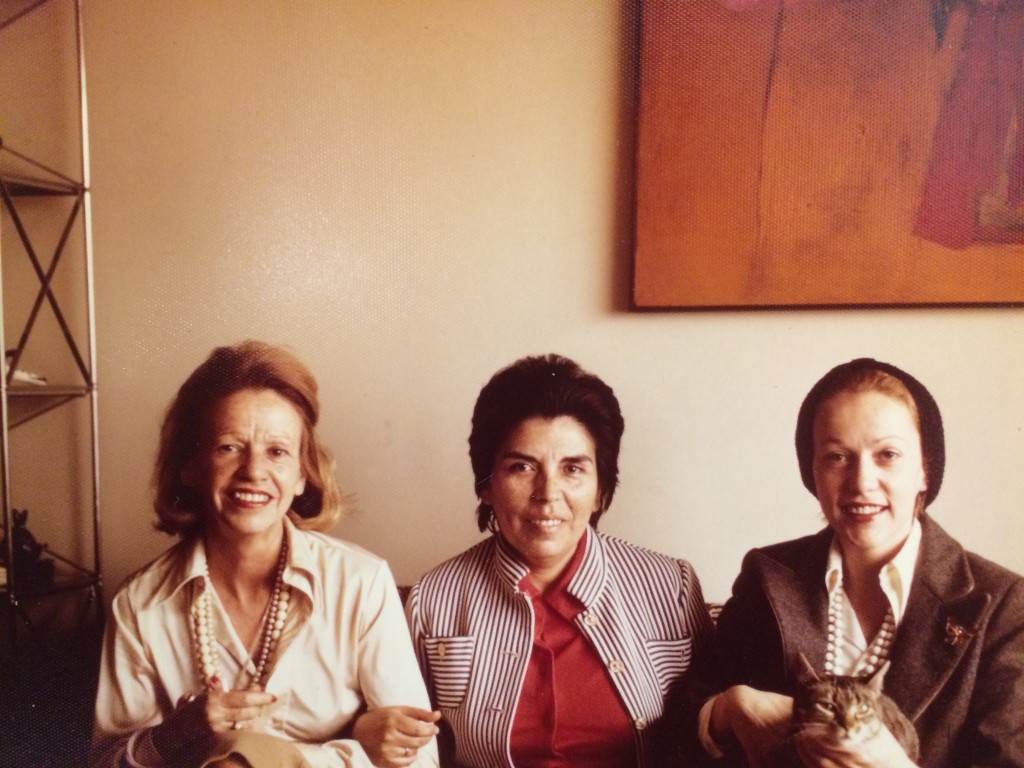
Photograph of Elena Garro, Gabriela Mora, and Helena Paz Garro taken at Mora’s home in New York City, 1970. From the Gabriela Mora Collection of Elena Garro (C0994).
New finding aids include the following:
Thomas Colchie ’64 Collection on Jorge Amado (C1450)
The collection consists of twenty-four audio cassette recorded interviews conducted by Thomas Colchie (Princeton University alumnus, Class of 1964) of or about Brazilian writer Jorge Amado. Recordings include interviews with Jorge Amado and other writers and artists speaking about Amado. Also includes photocopy documents about Amado’s political involvement as an elected representative in Brazil’s National Constituent Assembly from 1945-1947, and photocopy documents of Brazil’s National Intelligence Service (SNI) file on Amado.
Plural Editorial Files (C1479)
The Plural Editorial Files is comprised of the editorial correspondence of Plural (1971-1976), the Mexican journal of literature, politics, art, and cultural commentary. Files include correspondence with Plural editors and personnel Octavio Paz, Kazuya Sakai, Danubio Torres Fierro, José de la Colina, Sonia Levy-Spira, Julio Scherer García, Tomás Segovia, and others. Contributor correspondence include a wide range national and international of writers, publishers, and intellectuals from Latin America, United States, and Europe.
Vuelta Editorial Files (C1480)
The Vuelta Editorial Files is comprised of the publishing files of Vuelta (1976-1998), the Mexican journal of literature, politics, art, and cultural commentary. Includes author files, correspondence between editors, writers, translators, scholars, and rights publishing companies, and administrative and project files. Includes original and photocopy typescript and handwritten manuscript submissions of articles, interviews, translations, narrative, and poetry. Related research materials such as press clippings and printed material are also found in the author files and correspondence. Included in the files are documents relating to Encuentro Vuelta – El Siglo XX: La Experiencia de la Libertad, a televised conference series program organized by Vuelta in 1990 about the rise of socialism in Eastern Europe. Series 6 includes various booklets and speech materials from the Nobel Prize ceremony in 1990, the year Octavio Paz was awarded the Nobel Prize in Literature.
Paul A. Volcker Papers (MC279)
Paul A. Volcker (1927-) is an economist who has served in several prominent positions in the federal government, most notably as undersecretary of the Treasury (1969-1974), chairman of the Federal Reserve (1979-1987), and chairman of President Obama’s Economic Recovery Advisory Board (2009-2011). The collection primarily consists of Volcker’s subject files, mostly created during his terms as president of the Federal Reserve Bank of New York or as chairman of the Federal Reserve, and his correspondence with a variety of individuals. Much of Volcker’s Federal Reserve correspondence is in reply to private citizens, though letters to and from White House staff and members of Congress also constitute a large portion of the collection. To a lesser extent, the collection contains records from the meetings of the Federal Open Market Committee under Volcker’s chairmanship of the Federal Reserve, as well as Rockefeller Foundation publications and documents that address Volcker’s relationship to the Foundation as the Federal Reserve Bank of New York president. The collection also includes Volcker’s phone logs from his term as undersecretary of the Treasury.
Thomas John Dibdin “Twelve Songs” Manuscript (N-000065)
Dated 1832, this manuscript consists of twelve apparently unpublished songs by songwriter and theater manager, Thomas John Dibdin (1771-1841), composed in 1832, a year before he issued his collection of songs entitled “Last Lays of the Last of the Three Dibdins” (London, Harding and King, 1833). None of these songs appears to be in that collection; and a later hand has written “all unpublish’d 1851” above the title. The songs in this collection include “The Deserted Village” (ff. 3-4), “The Runaway” (12-13) and “Bacchus was a Gentleman” (16-17), among others.
Allen & Smith Company Account Book (Q-000021)
This account book, dating from 1860-1871, charts the rising fortunes of the Nevada City, California mining firm of Allen & Smith, formed by Henry Smith and Thomas Allen in April 1860. The ledger documents the company’s founding, the discovery of gold in May 1861, and the firm’s expansion with the opening of store in late 1862.
New additions to existing collections were added to the following finding aids:
Gabriela Mora Collection of Elena Garro (C0994)
The collection includes correspondence to and from Mexican author Elena Garro and Chilean American critic and scholar Gabriela Mora, a handwritten testament by Elena Garro and photographs of Gabriela Mora, Elena Garro, and Elena Garro’s daughter, Helena Paz Garro. Added to the existing collection are eight audio cassette tapes containing unpublished interviews and readings of Elena Garro, conducted by Gabriela Mora done in New York City in 1974 and in Spain in 1979.
American Civil Liberties Union Records: Subgroup 4 (MC001.04)
Series 6: September 2015 Accession, 1971-2004, includes records that represent a broad range of the ACLU’s activities in the late twentieth and early twenty-first century. In particular, this series documents the ACLU’s Lesbian, Gay, Bisexual, Transgender and AIDS Project; Racial Justice Program; Speech, Privacy, and Technology Project; Women’s Rights Project; and the office of the Legal Director. To a lesser extent, this series includes records from the Reproductive Freedom Project and National Prison Project.
Association on American Indian Affairs Records (MC147)
Series 16: 2015 Accession, 1975-2015, consists of three boxes of notes, reports, government documents, briefs and other legal materials, correspondence, memoranda, and instructional materials (produced by the American Indian Lawyer Training Program, Inc. and the Indian Law Support Center of the Native American Rights Fund, among others). These materials pertain to the protection of natural resources, religious freedom, the Indian Child Welfare Act (ICWA), the Native American Grave Protection and Repatriation Act (NAGPRA) and repatriation issues more broadly, and other issues of concern to the AAIA. The series also contains two boxes of packets from the AAIA’s board meetings and teleconferences.
